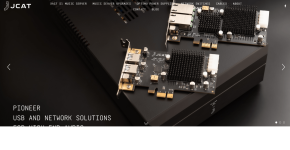The do not!How do they cope with the usual abuse on tge workbench (like accidental overvoltage and stuff)?
It is on you to limit input levels accordingly.
Not that show-stopper imho.
For measurements or for playing back/ recording audio? For measurements I am currently quite happy with the Quantasylum QA403.Piggybacking on to this, does anyone has a recommendation for top performance sound card?
Cost no object.
Jan
Ok. In that drawer there is only the E1DA Cosmos. That probabaly doesn't matter for the review but I still use a Vellemann PCSGU250 along the QA403 when 403's bandwidth isn't enough, e.g. for checking signal transformer resonances.
I wonder if there are reasonable priced sound cards out there tht get down to the QA403's low distortion, like all harmonics below -110dB?
Jan
Jan
Using a notch filter will help. Apart from that one of the main reasons I had for switching from using a soundcard with REW or Arta was the convenience of not having to deal with calibration and setup issues. Some people complain about missing asio support and being bound to the manufacturers software. To me it's actually a plus but to each their own.
APx555 -you said cost no object. . .
Actually there are a lot of details that influence a selection.
First what is it for? Music recording? Or playback? Measurements?
How many channels?
What interface. ISA?? PCI, PCIE, Firewire, USB, Ethernet?
The answers are not simple or obvious.
Actually there are a lot of details that influence a selection.
First what is it for? Music recording? Or playback? Measurements?
How many channels?
What interface. ISA?? PCI, PCIE, Firewire, USB, Ethernet?
The answers are not simple or obvious.
Actually a Lynx L22 or an EMU1212m or 1616m can meet that spec. The AKM adc on those can get to -130 on harmonics if well optimized.I wonder if there are reasonable priced sound cards out there tht get down to the QA403's low distortion, like all harmonics below -110dB?
Jan
I am using a steinberg UR22C, 192kHz and 24bit full duplex, and the noise floor is very low . The software I use can do averaging and that gives very smooth and clean graphs. Agree to the comment that you should somewhat protect the Inputs and outputs - Just had to buy a new one 😀
Does that still require the QA specific lock-in software, or does it work like a conventional USB sound interface, allowing the use of whatever software the user likes?the QA403
It uses a nonstandard hardware USB interface. It's all published open source. An ASIO interface was created for the QA401 but it used different USB hardware. Could be done for the QA403. But not on their current roadmap. Lots more at their forum.
But this is only the DAC, no? Is there a separate ADC?
Jan
E1DA is ADC! There is also an APUI wonder if there are reasonable priced sound cards out there tht get down to the QA403's low distortion, like all harmonics below -110dB?
Jan
https://www.linsoul.com/products/e1da-cosmos-adciso
https://www.linsoul.com/products/e1da-apu-cosmos
Last edited:
Search for Julian Krause on YouTube. He test sound cards and keep a track record of performances, that may give you some ideas where to look for.I wonder if there are reasonable priced sound cards out there tht get down to the QA403's low distortion, like all harmonics below -110dB?
Jan
Thanks for the tip. But I don't think that video gives information on the best interface for measurements.
Jan
Jan
Yes ADC, I messed up. And that APU seems very useful!E1DA is ADC! There is also an APU
https://www.linsoul.com/products/e1da-cosmos-adciso
https://www.linsoul.com/products/e1da-apu-cosmos
But a 'sound card' functionality also needs a DAC. Where is that in that series?
Edit: found it here https://e1dashz.wixsite.com/index/cosmos-dac
Jan
There is also an scaler
https://e1dashz.wixsite.com/index/cosmos-scaler
I have only ADC but without usb isolator built in, I am very satisfied, very good device. Need to buy an isolator soon. New ADC have built in isolator.
https://e1dashz.wixsite.com/index/cosmos-scaler
I have only ADC but without usb isolator built in, I am very satisfied, very good device. Need to buy an isolator soon. New ADC have built in isolator.
That's a total show stopper for me. Things do go wrong on the testbench, no matter how hard I try to avoid them. Otherwise there would be no need for a testbench.It is on you to limit input levels accordingly.
Not that show-stopper imho.
I absolutely need a workshop/testbench tool, not an audio production machine. It it goes down to -120 dB distortion or better, fine. If not, fine.
My RTX6001 is just perfect for my needs. It has switchable and accurate (calibrated) voltage levels. It works with any software designed around sound cards, so it can be used for pretty much any type of electronic and acoustic measurements (sources, amps, loudspeakers, etc.). And it just smiles at you if it accidentally gets a dose of tube-amp high voltage to its inputs...
- Home
- Design & Build
- Equipment & Tools
- sound card test
